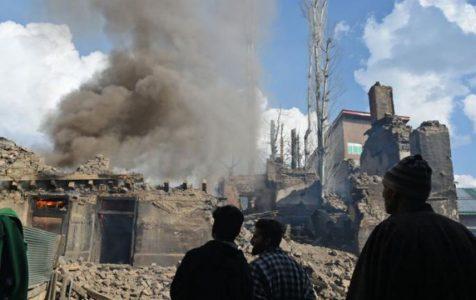
Pakistani authorities should act to stop the terrorist acts in India
Last month’s terrorist attack at Pulwama in Jammu and Kashmir, India, in which a suicide bomber from the Pakistan-based terrorist organization Jaish-e-Mohammad (JeM) killed forty members of an Indian Central Reserve Police Force convoy sheds new light on the urgency of combatting terrorism, not only in the sub-continent – and specifically Pakistan – but throughout the international community.
It also bears noting, argues the Government of India, that JeM, which claimed responsibility for the Pulwama attack, “has carried out a series of attacks against India in the past, including on the Indian Parliament in New Delhi in December 2001 and on an Indian Air Force base in January 2016.”
Moreover, the unwillingness of Islamabad to act as a responsible member of the international community following the February 14 attack has led to rising bilateral tensions between Pakistan and India, including an assessed necessitated retaliatory attack by India on a terrorist training facility in Pakistan and the downing of at least one Indian air force jet.
According to the Government of India, India carried out a “non-military anti-terror pre-emptive” strike on JeM’s largest training camp in Pakistan on February 26. However, this strike only came after India reportedly received credible intelligence that JeM was planning similar attacks in India.
The military action authorized by New Delhi also contrasts, say Indian authorities, to alleged unprovoked acts of aggression by Pakistan following the February suicide bombing, including violations of Indian air space and the targeting of Indian military assets, including the downed fighter jet.
Further, the preemptive Indian strike, according to New Delhi, was deemed mandatory due to a documented history of Islamabad failing to abide by a 2004 commitment not to allow its territory to be used for terrorism. With regard to the February terrorist strike and ensuing Indian counter-operation, as per the Government of India, Islamabad has tried to eschew its commitments and muddle the security situation with such claims as “insinuating that India’s response to the terrorist attack is determined by the forthcoming [Indian] General Election.”
For years, India has consistently stressed that it has shared with Pakistan information on the involvement of Pakistan-based terrorist groups in terrorist attacks in India and requested action to be taken. Pakistan, however, has consistently denied the existence of these groups or their infrastructure in territories under its control. As a result, as per Indian arguments, “terrorist organizations have continued to plan and execute attacks against India with impunity from their sanctuaries in Pakistan.”
It is in this background, that the Government of India is calling on the international community to pressure Pakistan for a de-escalation to the current India-Pakistan standoff in keeping with international law and norms. New Delhi underlines that this is in further keeping with recent United Nations statements “reaffirming that all forms of terrorism pose a serious threat to peace, security and prosperity” – not just in the subcontinent but throughout the world. This, in addition to the need to hold accountable all those involved in acts of terrorism and terrorist organizations.
As South Asia and the international community continue to face challenges from the potential for terrorist attacks, the imperative of applying lessons learned in the prevention of international and domestic terrorism grows ever greater.
First, open lines of communication in conjunction with strong, working relationships with neighbouring countries are critical in defeating cross-border acts of terrorism. Without such government-to-government relations, bases of terrorism in one country can more readily be used to spread terror across international boundaries. Recent events in the subcontinent, for example, should not be seen in isolation. Those training in terrorist camps in Pakistan could theoretically choose to strike anywhere in the world.
Second, every national government should prioritize the alleviation of domestic conditions that could prove fertile to recruitment for terrorist organizations. Coupled with this, it is not enough to simply use force to fight terrorism. It is equally, if not more, important to buffer the use of force with a concerted effort to dismantle root causes for terrorism in the social fabric of society.
As such, it is imperative that Pakistan acts as a responsible member of the international community’s fight against terror so as to promote an atmosphere of peace and stability throughout South Asia and beyond. Similarly, governments other than Islamabad throughout the world must keep a watchful eye on the spectre of terrorism, as the strengthening of bases for terrorism in foreign lands could be used to further embroil existing tensions in South Asia.
For its part, in response to the recent deadly suicide bombing and in the absence of any reciprocative behavior on the part of the Government of Pakistan, the Government of India has reiterated that it “is firmly and resolutely committed to take all necessary measures to safeguard national security” along with being “equally resolved to fight against the menace of terrorism” while demanding “that Pakistan stop supporting terrorists and terror groups operating from their territory and dismantle the infrastructure operated by terrorist outfits to launch attacks in other countries.”
Source: Mizzima





